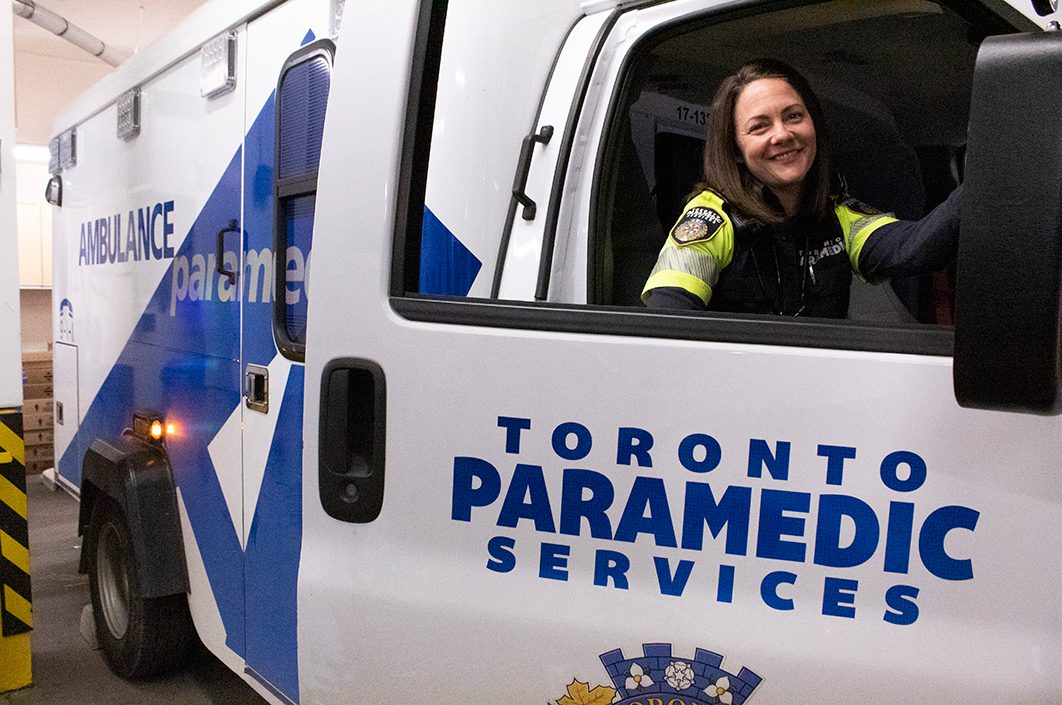Jennifer Bassett-Spiers is washing down the ambulance when she’s interrupted by a call on the radio alerting her to an emergency nearby. It’s 4:12 a.m. and the streets around Toronto Paramedic Services Station 40 are quiet.
At any other time, the intersection of Church Street and Richmond Street East, half a block east of the station, would be buzzing with horns and pedestrian traffic. At this hour, no one can be seen for blocks.
Within minutes, Bassett-Spiers and her partner have jumped into the ambulance, flicked on the sirens and are racing through the streets of the city. What they find at their destination may live with them long after tonight.
“I would definitely say that (the days following a tough call) are probably the hardest,” says Bassett-Spiers, who’s been doing the job for 10 years. Depending on the “severity” of the call, it can take about two weeks before she “knows that things are going to get better,” she says.
A 2016 study published in the Journal of Community Safety and Well-Being reported that paramedics have a 26 per cent chance of developing post traumatic stress disorder over their lifetime, compared to 9.2 per cent for the general population.
First responders who suffer from mental illnesses – like PTSD, acute stress disorder, anxiety and depression, among others – may find it difficult to focus on their well-being because of the intense nature of their work. They often lean on each other for support, says Bassett-Spiers.
(Story continues below)

“I would definitely say that (the days following a tough call) are probably the hardest.”
– Bassett-Spiers
“The best part about being a paramedic is that you have a paramedic family, a group of people who see and experience the same types of calls that you do and that you struggle with and they struggle with as well. And you get through it together,” she says.
Tom Walker, 53, a social worker who specializes in paramedic support, says that the most difficult calls are pediatric calls.
“Most of my paramedics hate those calls, especially with my younger paramedics, who may have a kid at home the same age,” he says.
Those calls “change someone’s life trajectory forever, just because they were in the wrong place at the wrong time,” he says.
Walker said that seriously injured people sometimes beg paramedics to keep them alive in the midst of an emergency. All a first responder can promise an injured person is to do everything they can.
Walker works at Ornge, an ambulance service that provides both air and land medical transport across Ontario. Ornge also focuses on supporting the mental well-being of the paramedics who work for them.
“I think Ornge is doing a lot” to help its staff, says Walker. “They have someone on full time. They also have other people in the back end trying to take care of the paramedics.”
Ontario is one of seven provinces and territories that accepts workplace compensation claims related to mental illness, along with Alberta, B.C., Saskatchewan, Newfoundland and Labrador, the Northwest Territories and Nunavut.
“We’re trying to make sure that our staff are supported through a difficult call, they have a little bit of time before they go on the next call so that they can get their shit together and can be able to sort of get recalibrated and ground themselves,” says Walker. “We could always use more support … but we’re doing well.”
Ontario’s progressive stance on mental health support for first responders is welcomed by paramedics like Bassett-Spiers, who also feels supported by her workplace.
“I think we’re in a good spot right now,” she says. “We’re getting recognition from the employer that we need to take more time … We do suffer a little bit because of the trauma that we’re exposed to, but I’m hopeful.”
Check out more Toronto at 4 a.m. content here!
Online: Toronto Observer
Instagram: @6ix_at_4
Twitter: @6ix_at_4
Facebook: @6ixat4

